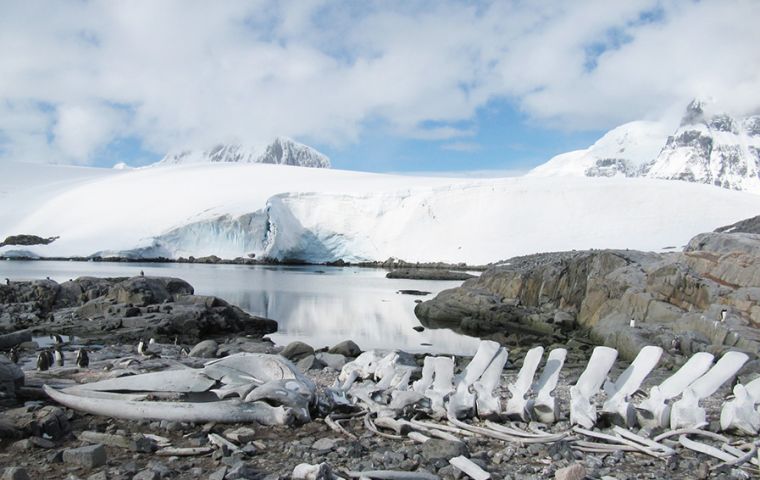MercoPress. South Atlantic News Agency
History of whaling in South Georgia and its impact revealed with DNA samples
 Whale bones littered for years the beaches of South Georgia
Whale bones littered for years the beaches of South Georgia  More than 175,000 whales were killed during the 60 years shore whaling industry in South Georgia.
More than 175,000 whales were killed during the 60 years shore whaling industry in South Georgia.  DNA sequences show a high level of genetic diversity in the whales, said Angela Sremba, from Oregon State University and lead author on the study
DNA sequences show a high level of genetic diversity in the whales, said Angela Sremba, from Oregon State University and lead author on the study Bones that have littered the beaches of South Georgia for a hundred years since the animals were killed by whalers are now being used to establish what species of whale were being hunted, reports South Georgia’s April Newsletter.
Early whalers in South Georgia used only the outer blubber of the whale and let the rest of the carcass, the skrott, float away to rot on nearby beaches. The wasteful practice was mainly brought to an end a few years later when government policy was brought in to force the whalers to use the entire whale carcass including the bones.
Scientists collected samples from 281 whale bones to identify the species of whales killed and successfully extracted DNA from 82 samples. The study represents the most comprehensive investigation of historic genetic diversity in whales from around the Antarctic region prior to commercial whaling. The majority of the animals (158) were humpback whales, 51 were fin whales, 18 blue whales, two sei whales, and one a southern right whale. (One of the bones turned out to be from an elephant seal). Their findings are being published in the journal Marine Mammal Science.
“From a preliminary look at the DNA sequences, it appears that there was a high level of genetic diversity in these whales, which is what we'd expect from pre-exploitation samples,” said Angela Sremba, a doctoral student in the Department of Fisheries and Wildlife at Oregon State University and lead author on the study.
“The DNA from the bones has been surprisingly well-preserved, but it is important to capture this information now because the bones are susceptible to further degradation and contamination with age.” Sremba believes most of the whale bones in the study are from the early period of whaling on the SG Island, from 1904-13. “The species composition of the bone collection is quite similar to catch records during that time,” she said.
More than 175,000 whales were killed during the 60 years shore whaling industry in South Georgia.
Scott Baker, associate director of Oregon State's Marine Mammal Institute, USA, and co-author on the paper, said whale populations still have not recovered in the Southern Ocean despite an abundance of food.
“The waters around South Georgia Island were productive feeding grounds for great whales before whaling,” Baker said, “yet they have not returned here in any numbers despite nearly 50 years of protection. That suggests the possibility that the local population was extirpated, resulting in the loss of some cultural knowledge about the habitat.”
Sremba, who is based at OSU's Hatfield Marine Science Center in Newport with Baker, said knowledge of the whales' genetic diversity captured from these bones is invaluable. “This unique resource will allow us to compare historical genetic diversity to contemporary populations to assess the potential impact of the 20th-century commercial whaling industry,” she said.



Top Comments
Disclaimer & comment rules-

-

-

Read all commentsAre these bones redolent of Argentine ambition in the area?
May 23rd, 2014 - 12:22 am 0South Georgia (Argentina) MercoP news, I can't wait for John N. update.
May 23rd, 2014 - 01:35 am 0Looks like Cristina expropriated all the blubber for her Botox treatments leaving only a few bones for her people to chew on. (analogy - she's not allowed on a BoT).
May 23rd, 2014 - 03:22 am 0Commenting for this story is now closed.
If you have a Facebook account, become a fan and comment on our Facebook Page!